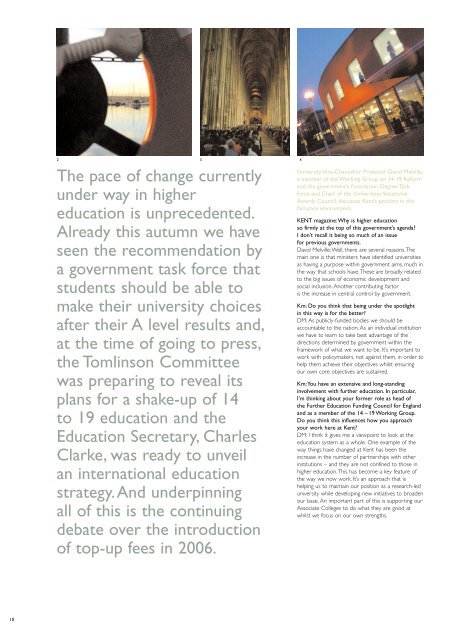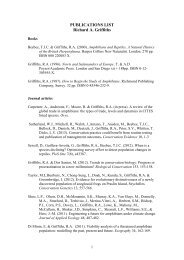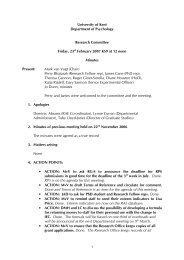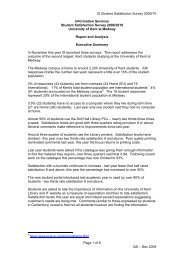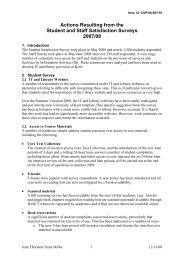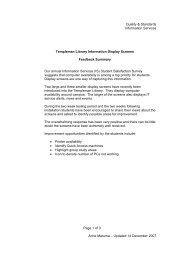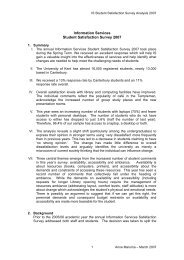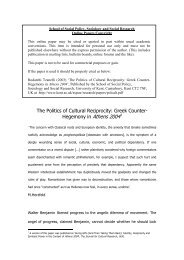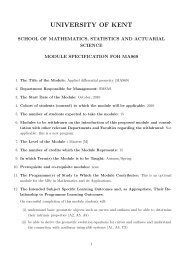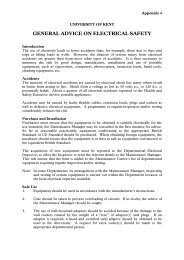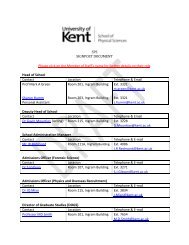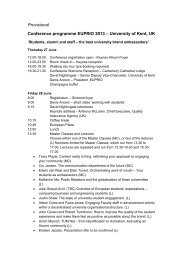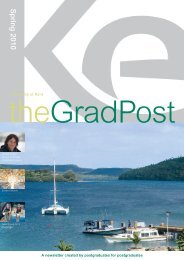KENT MAGAZINE AW - University of Kent
KENT MAGAZINE AW - University of Kent
KENT MAGAZINE AW - University of Kent
You also want an ePaper? Increase the reach of your titles
YUMPU automatically turns print PDFs into web optimized ePapers that Google loves.
2 3 4<br />
The pace <strong>of</strong> change currently<br />
under way in higher<br />
education is unprecedented.<br />
Already this autumn we have<br />
seen the recommendation by<br />
a government task force that<br />
students should be able to<br />
make their university choices<br />
after their A level results and,<br />
at the time <strong>of</strong> going to press,<br />
the Tomlinson Committee<br />
was preparing to reveal its<br />
plans for a shake-up <strong>of</strong> 14<br />
to 19 education and the<br />
Education Secretary, Charles<br />
Clarke, was ready to unveil<br />
an international education<br />
strategy.And underpinning<br />
all <strong>of</strong> this is the continuing<br />
debate over the introduction<br />
<strong>of</strong> top-up fees in 2006.<br />
<strong>University</strong> Vice-Chancellor Pr<strong>of</strong>essor David Melville,<br />
a member <strong>of</strong> the Working Group on 14-19 Reform<br />
and the government’s Foundation Degree Task<br />
force and Chair <strong>of</strong> the Universities Vocational<br />
Awards Council, discusses <strong>Kent</strong>’s position in this<br />
fast-pace environment.<br />
<strong>KENT</strong> magazine:Why is higher education<br />
so firmly at the top <strong>of</strong> this government’s agenda?<br />
I don’t recall it being so much <strong>of</strong> an issue<br />
for previous governments.<br />
David Melville: Well, there are several reasons.The<br />
main one is that ministers have identified universities<br />
as having a purpose within government aims, much in<br />
the way that schools have.These are broadly related<br />
to the big issues <strong>of</strong> economic development and<br />
social inclusion. Another contributing factor<br />
is the increase in central control by government.<br />
Km: Do you think that being under the spotlight<br />
in this way is for the better?<br />
DM: As publicly-funded bodies we should be<br />
accountable to the nation. As an individual institution<br />
we have to learn to take best advantage <strong>of</strong> the<br />
directions determined by government within the<br />
framework <strong>of</strong> what we want to be. It’s important to<br />
work with policymakers, not against them, in order to<br />
help them achieve their objectives whilst ensuring<br />
our own core objectives are sustained.<br />
Km:You have an extensive and long-standing<br />
involvement with further education. In particular,<br />
I’m thinking about your former role as head <strong>of</strong><br />
the Further Education Funding Council for England<br />
and as a member <strong>of</strong> the 14 – 19 Working Group.<br />
Do you think this influences how you approach<br />
your work here at <strong>Kent</strong>?<br />
DM: I think it gives me a viewpoint to look at the<br />
education system as a whole. One example <strong>of</strong> the<br />
way things have changed at <strong>Kent</strong> has been the<br />
increase in the number <strong>of</strong> partnerships with other<br />
institutions – and they are not confined to those in<br />
higher education.This has become a key feature <strong>of</strong><br />
the way we now work. It’s an approach that is<br />
helping us to maintain our position as a research-led<br />
university while developing new initiatives to broaden<br />
our base. An important part <strong>of</strong> this is supporting our<br />
Associate Colleges to do what they are good at<br />
whilst we focus on our own strengths.<br />
10


